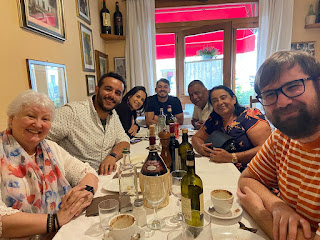 |
| Edwin and Andre entertain Theo |
If asked what I believe in, a rare enough question, I would describe it as Scientific Spirituality, a faith more akin to science than religion. It is driven by a spirit of inquiry, not dogma. It is open to individuals to seek, but does not wish to convert or proselytise, though it rejoices when someone genuinely wants to know how something really works at the deeper level. It accepts people for whom they are, not for what they believe. It seeks to encourage not to punish. It has no group organisation nor church, yet is taught in nature's harmony. All the distractions of the world, our concerns with status, fame, the latest laptop or phone, are but empty moments when compared to the experience of inner peace and the calm revealed by the unifying wholeness of understanding and wonder at the miracle of the natural world.
Scientific Spirituality does not preclude religion, or organised prayer, or group worship. But it does preclude religious exclusivity: the insistence that there is only one way, the intolerance of alternative thoughts or beliefs, the insistence that one book or one person's opinion holds the key to the Universe to the exclusion of all other thought. All religions may lead to Spirituality, but without the virtue of Scientific inquiry, they become rigid and exclusive rather than seeking to be open, expansive, and inclusive. Girders in the Sand was my attempt to bring the historical development of Scientific Spirituality into context, through centuries of spiritual development paralleling scientific advancement, building toward the frontiers of universal understanding.
On Sunday, Edwin and Andre were formally welcomed into the Methodist church in Bury St Edmunds, which they have been attending for some time. Ann and I went to witness this, with a lovely lunch of snacks provided by the congregation in the hall afterwards. Between them, they certainly bridge the concept of Scientific Spirituality.
Any death inspires reflective thoughts, even so modest an end as our Guinea pig, Bartok. Following his death, I penned a few thoughts, leading to the poem The Empty Cage.


